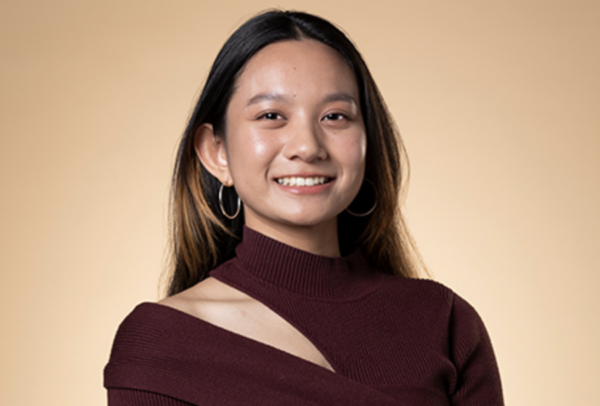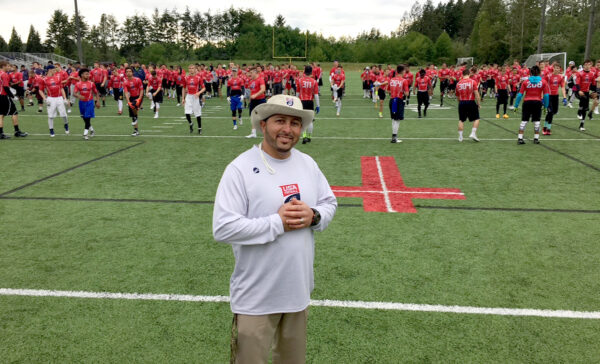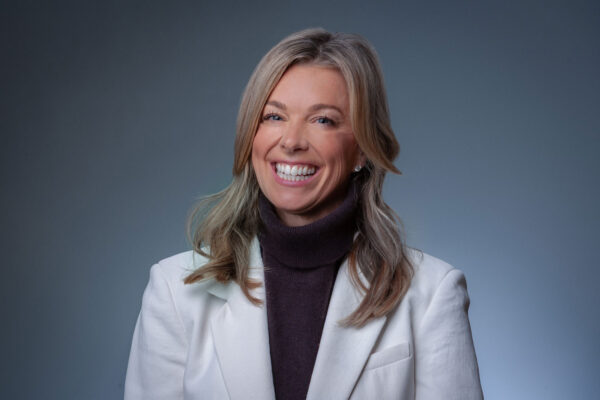Alumna Jadyn De Jesus was raised by a single, immigrant mother who, at times, worked three jobs to support herself and her daughter. Entering college as a first-generation student, De Jesus vowed to earn a degree — a symbol that would represent both her, and her mother’s, tireless drive to succeed.
Not only did De Jesus graduate in 2023 with a Bachelor of Arts in Health Studies from the University of Washington Bothell, she was also recognized as one of the UW’s Husky 100 honorees for 2023.
Each year the UW recognizes undergraduate and graduate students in all areas of study from the Bothell, Seattle and Tacoma campuses who are making the most of their time at the UW. The Husky 100 students actively connect what happens inside and outside of the classroom and then apply what they learn to make a difference on campus, in their communities and for the world. De Jesus is one of eight honorees from UW Bothell.
Seizing opportunities
De Jesus, like her mother, seized every opportunity, despite the natural fear and apprehension that is bound to be experienced in unfamiliar environments. She got involved in the Filipino American Student Association, worked as a peer coach and immersed herself in mental health outreach for youth at the nonprofit organization called National Alliance on Mental Illness.
“Jadyn stands out to me as a person who perseveres and has a very strong internal compass,” said Layla Taylor, former program manager of Community-Engaged Learning & Research at UW Bothell. “She shows up for what she believes in and is passionate about mental health and well-being for herself and others.
“Jadyn has a kind of clear-eyed focus and diligence that comes from a deep place in service of professional goals, personal growth and community development through a public health lens.”
Finding home
De Jesus described starting college as entering into a whole new world.
“I had no one who could pass on their knowledge, or to give advice or insight,” she said. “It was really intimidating. I spent my first year just trying to survive.”
In her sophomore year, however, she decided that surviving just wasn’t enough. She knew she was being presented with an incredible educational opportunity and was determined to make the most of it. “I pushed myself out of my comfort zone and joined the Filipino American Student Association,” she said. “It was the best decision I could have made, and I became the secretary my second year.”
Much more than a club, FASA introduced De Jesus to new friends, community and a place of belonging she never had before. “I feel the American side really took over in my education. I went to a predominately white school district and lost my connection to my Filipino roots,” she said. “I never had Filipino peers, clubs or events until UW Bothell. It felt nice to be with people with similar backgrounds and interests. It was something I hadn’t even realized I missed so much until I had it again.”
Wanting to pass that feeling of belonging to incoming students and to lessen the kinds of burdens that she had faced, De Jesus also became a peer coach.
Paying it forward
Peer coaches at UW Bothell are trained student leaders who help support all first-year students through one-to-one coaching sessions. The coaches are experts on campus who can help these new students adjust socially, academically and emotionally to help them have the best college experience possible.
De Jesus credits her own peer coach with giving her the confidence to get involved on campus and broaden her horizons. “It was actually because of my peer coach that I joined FASA,” she said. “She helped me get to a place where I felt comfortable opening up more, and I owe a lot of my college success to her. She is the one who inspired me to become a peer coach, too.”
In the position, De Jesus helped nearly 40 students have a more seamless transition into university life. “I made sure to check in frequently with the students I was overseeing and was always there to lend a listening ear or give advice when needed,” she said.
“As a first-generation student, I know how overwhelming and confusing college can be, and I also know what an impact having a peer coach who is invested in you can make,” De Jesus said. “It felt really good to be that for someone else — to pass that knowledge, insight and guidance that I remember needing so much.”
Speaking your mind
Wanting to continue helping others and investing in community, De Jesus began working with NAMI Eastside, an organization she was first introduced to in a Health Studies fieldwork class. Inspired by its mission to educate, advocate and spread awareness about mental health, she continued working with NAMI Eastside as a program assistant even after the class ended.
De Jesus engaged in community outreach and distributed promotional materials for the organization’s youth programs. “Working with youth specifically is something I am extremely passionate about as it is something I wish that I had when I was younger,” she said. “Mental health isn’t something that is frequently talked about in Filipino culture, and I was a very shy, closed-off kid. I think having that resource would have made a big impact on me, and I hope that it does for the younger generations.”
One of the projects De Jesus worked on was the 2023 Eastside Youth Mental Health Conference, which was designed to help young people, educators, families and community members understand mental health challenges — and gain tangible skills and resources to support youth.
Held annually, this year’s event was intended to raise awareness and reduce stigma about mental health using “Speak your mind” as its theme. “Youth were the leaders in this regard, and there were countless examples of young people sharing inspiring stories and insights,” De Jesus said. “Reminding people to speak their mind is not only encouragement to be open and honest about your mental health, but it is also recognition that prior generations can learn from this as well.”
As a first-generation student, I know how overwhelming and confusing college can be, and I also know what an impact having a peer coach who is invested in you can make. It felt really good to be that for someone else — to pass that knowledge, insight and guidance that I remember needing so much.
Jadyn De Jesus, Health Studies ‘23
Breaking the cycle
More than 100 people attended the conference, which made De Jesus proud. “I am so happy that so many people were able to come, talk and learn more about mental health,” she said. “I got so much out of this conference, and I hope others did, too.”
Looking to the future, De Jesus plans to pursue a career in public health and continue her work to change perceptions about mental health, especially within her community.
“In the Asian American community, a lot of us share that stigma and shame when it comes to mental health, such as having symptoms or even talking about it. Sometimes you get looked down upon or hushed, which I think is sad,” she said. “I wouldn’t want future generations to deal with that. And generational trauma gets passed on if things are not acknowledged.
“My goal as a graduate of UW Bothell is to break that cycle and de-stigmatize mental health.”



